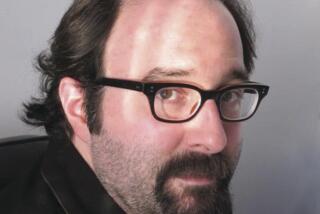Letters to Calendar: Let’s talk summer movies
Chewing up critics’ takes
What’s the point of having two film critics chew over the summer film season without any real critical insights [“Critics Chew,” Aug. 30]?
The reason superhero films seemed tired was because, besides the unassuming, playful “Ant Man,” they just weren’t any good and lacked the kind of directorial vision that made “Mad Max: Fury Road” so thrilling. They were money-making obligations instead of organic films. Why do both critics repeat the received wisdom that “Trainwreck” was subversive or transformative filmmaking? After a promising start, the film turned oddly old-fashioned and conventional. To find love, the woman must embrace everything she has contempt for and even literally become one of things she despises most: a cheerleader. Hardly revolutionary.
Rebecca Keegan somehow thinks N.W.A’s primary fan base is African American. Maybe in 1988. The reason for the success of “Straight Outta Compton” was because it reached N.W.A’s huge cross-cultural fan base not because it reached a neglected market. The success says more about hip-hop’s appeal than Hollywood acumen.
And not one mention of the summer’s best performance, from Jason Segel?
Ken Capobianco
Long Beach
Taking a closer look at Franzen
Sadly, Jonathan Franzen remains the same misogynist he always was [“Jonathan Franzen Dives Into the Digital Age,” Aug. 30]. In this new book, many reviews concede that Franzen continues to represent women as pitiful creatures, bad mothers and not part of the meaningful world. So, no, I will not read this book. Until he takes a remedial course on women’s history, he can’t expect the greater numerical majority of the world to take his books seriously.
Abigail Jardine
Pasadena
::
It was said that Andreas Wolf refers to Julian Assange, but the name Wolf points even more to the ingenious spy and manipulator Markus Wolf, who was head of the Main Directorate for Reconnaissance inside the Ministry of State Security in the former German Democratic Republic. Markus Wolf was so famous in his time that this cannot be a coincidence, and Jonathan Franzen lived in Berlin some time in the ‘80s.
I guess there must be something in the novel about manipulation of others for one’s own purposes and deceit. The Politburo comparison seems to point into that direction. Anyway, the combination of GDR and Internet is peculiar, but the underlying message could be that both share the totalitarian impulse.
Joseph Goettgens
Würselen, Germany
Point and counterpoint
I am writing in response to a letter suggesting that N.W.A’s misogyny has green-lighted abuse of women for generations to come. If we’re blaming N.W.A, why not also blame other groups sending this message including the film, advertising, beauty and video game industries?
My counter to the writer’s point is since we know these industries are in business to make money and use these means to gain buzz and sales, why do we not instead raise our daughters to not accept or tolerate abuse of any kind (and our sons to respect women) regardless of what they observe as entertainment? It is our responsibility to help children strengthen their self-esteem and confidence rather than continuing to perpetuate victim-mentality thinking.
I attended high school during N.W.A’s heyday and listened to their music and I have never been called a “ho” nor have I ever been beaten by anyone. Listening to their music (and all of the other rap music to which I have listened) did not instill within me a frame of thinking that I deserve to be disrespected, beaten, cheated on or belittled.
Tamera Hanna Roten
Woodland Hills
::
Re a “blessing and a curse” [Feedback, Aug. 30),] the letter writer refers to “... the first years of TV programming, when an early TV critic, Newton Minow, called TV ‘a vast wasteland.’”
Wrong era, wrong lesson. It was in 1961 that Newton Minow, who was not a critic but chairman of the Federal Communications Commission under John F. Kennedy, used this phrase in a speech to the National Assn. of Broadcasters. This was a big deal because broadcasters understandably feared censorship and possible loss of licenses. Lyndon Johnson later reversed the threat and made nice to the broadcasters because he wanted their support to promote his own plans and programs.
George Bowden
Encino
More to Read
The biggest entertainment stories
Get our big stories about Hollywood, film, television, music, arts, culture and more right in your inbox as soon as they publish.
You may occasionally receive promotional content from the Los Angeles Times.










